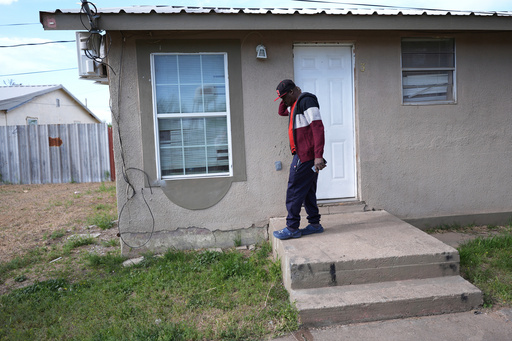In Panhandle, Texas, a quiet, windswept town where residents can stroll down the center of Main Street undisturbed, Kevenson Jean, a truck driver, busily tends to his lawn. His focus is on ensuring neatness around his two-bedroom home, which he shares with his wife. The couple fled Haiti due to the escalating violence there, driven by dreams of achieving the American dream—a vision they held until recent developments clouded their future.
The couple finds themselves amidst growing uncertainty affecting immigrant communities across Texas. Historically, generations of immigrants have come to this region to seek employment in the massive meatpacking plants that became central as Texas rose to prominence as a leading cattle producer. However, an abrupt change under President Donald Trump’s administration threatens their stability, as many legal avenues for immigration are being closed.
“We follow the law. We’re not criminals. We’re contributing,” Jean emphasized. Echoing his sentiments, he shared the fulfillment he finds in his work and cultural experiences including enjoying American football and beer, while his wife Sherlie studies English diligently. Despite their compliance with immigration protocols, they now face uncertainties due to the administration’s stance on temporary legal statuses.
Messages from the Department of Homeland Security urged many like Jean to prepare for potential deportation. The directive is part of a broader effort initiated under Trump, who justified his policies by painting a picture of rampant illegal immigration. While legal immigrants also find their paths obstructed, the Trump administration is targeting a variety of legal immigration pathways, impacting nearly 2 million immigrants.
Despite sympathizing with aspects of the immigration crackdown, Jean contends that not all newcomers are threats. He and others argue their presence supports essential industries and communities. Concerns ripple through tight-knit immigrant communities, leaving families to ponder their next steps amid the backdrop of legal battles aimed at altering immigrant statuses.
At the heart of uncertainty, many like Lesvia Mendoza, a special education teacher from Venezuela living in Texas, question their future. While indignant about the crackdown affecting lawful immigrants like her, she questions the repercussions of potential deportation on the economy and lives of families. Her contemplation is shared by Nicole, a Haitian worker at a meatpacking plant reliant on foreign labor.
In Panhandle’s diverse town of Cactus, a microcosm of global cultures thrives in a familiar yet increasingly uncertain environment. The town’s meatpacking industries are heavily dependent on immigrant labor, a reality that surfaces significant challenges should policies result in mass deportations. Workers, historically from various continents, highlight the industry’s dependency on immigrant contributions.
Idaneau Mintor, an immigrant from Haiti, experiences firsthand the solitary weight of uncertainty. Despite following regulations, his life oscillates around supporting family back home and working under demanding conditions at a local meatpacking facility. Without friends and fear of engaging with the broader community, work remains his solace.
For Jean, each day adds emotional weight. Having come to the U.S. under a non-profit’s sponsorship, his expectation of stability was thwarted by legal complexities surrounding his work status. Nonetheless, his connection to his work and the country he now calls home remain strong. After enduring sleepless nights contemplating his future, an unexpected reprieve allows him to continue working.



